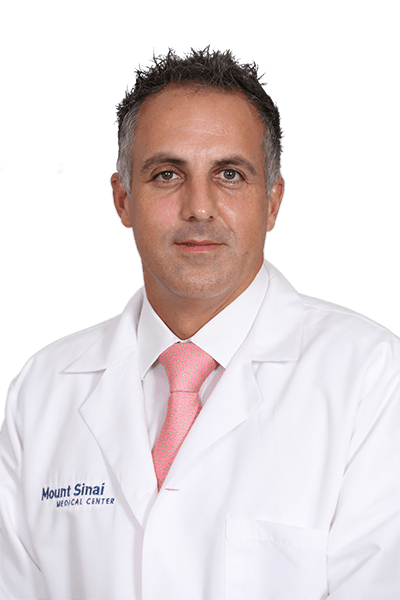What you need to know about head and neck cancer treatments that provide life-saving results
By Dr. Rodrigo Arrangoiz, MS, MD, FACS, FSSO, Surgical Oncologist, Mount Sinai Medical Center
From the way we speak and eat to how we breathe and express emotions, the head and neck region plays a vital role in daily life. Unfortunately, this complex area is also susceptible to a variety of cancers that can dramatically affect a person’s health and quality of life. That’s why understanding head and neck cancers—their risk factors, symptoms, and treatment options—is critical for early detection and successful outcomes.
Head and neck cancer is an umbrella term that covers a range of malignancies that can begin in different parts of the region. The type of cancer depends on where it starts and so does the treatment. Although they’re not incredibly common, head and neck cancers are far from rare. According to the National Cancer Institute (NIH), doctors expect to diagnose more than 72,000 people in the United States with a head and neck cancer in 2025 alone. These cases often involve complex diagnoses and require a multidisciplinary approach to treatment.
For Head and Neck Cancer Awareness Month, it’s important to highlight what puts you at risk, the treatments and surgeries available, and what Mount Sinai offers in terms of support, expertise, and compassionate care. While each cancer is unique, what all cancer diagnoses share is the need for high-quality, personalized care, especially when surgery is part of the equation.
Risk Factors You Should Know
Lifestyle plays a serious role in the development of head and neck cancers. Tobacco use and excessive alcohol consumption remain two of the most significant contributors. Overexposure to UV light, especially for those who work outdoors, also raises the risk of skin cancers in the head and neck region. Another lesser-known factor is the human papillomavirus (HPV). Best known for its connection to cervical cancer, HPV is now the leading cause of oropharyngeal cancer (a malignancy that starts in the middle of the throat), which is common among younger, non-smoking patients. HPV-related oropharyngeal cancer is now the fastest-growing type of head and neck cancer in the United States.
Speak Up and See a Specialist
If you feel a lump in your neck, persistent hoarseness, difficulty swallowing, or any unusual growth in your mouth or throat, schedule an appointment with your PCP. It’s better to be safe and catch anything early. Your doctor may refer you to a head and neck surgical oncologist for further evaluation. While head and neck cancers aren’t the most common, they do occur, and it’s important to be knowledgeable of the risks and symptoms, as well as your options in treating care should you be diagnosed.
Diagnosis and Treatment
When it comes to complex tumors and conditions of the head and neck, surgery usually comes into play. A subspecialty that focuses primarily on the diagnosis, treatment, and management of both benign (non-cancerous) and malignant tumors (cancerous), head and neck surgeries can address anything from the scalp and facial structures to the larynx (voice box) and salivary glands.
Surgical oncologists are trained to navigate some of these areas with precision and care and have many tests done on the patient before suggesting moving into surgery. Surgeons typically handle tumors that appear in areas such as:
- The throat and larynx
- Thyroid and parathyroid glands
- Salivary glands (like the parotid and submandibular glands)
- Skin and soft tissue of the head and neck
- Mouth, jaw, and nearby sinuses.
While every patient is different, here are some of the more common surgeries performed in this specialty:
- Thyroid surgery for overactive glands or tumors
- Salivary gland removal for when tumors or blockages occur
- Lymph node dissections, often part of cancer treatment
- Mouth and throat tumor removals, sometimes involving parts of the tongue or larynx
- Skin cancer removal and reconstruction for facial or neck areas
In many cases, these surgeries are part of a broader treatment plan that may include radiation or chemotherapy, especially for cancer patients.
To learn more about Mount Sinai’s Comprehensive Cancer Center, please visit msmc.com/comprehensive-cancer-center/



